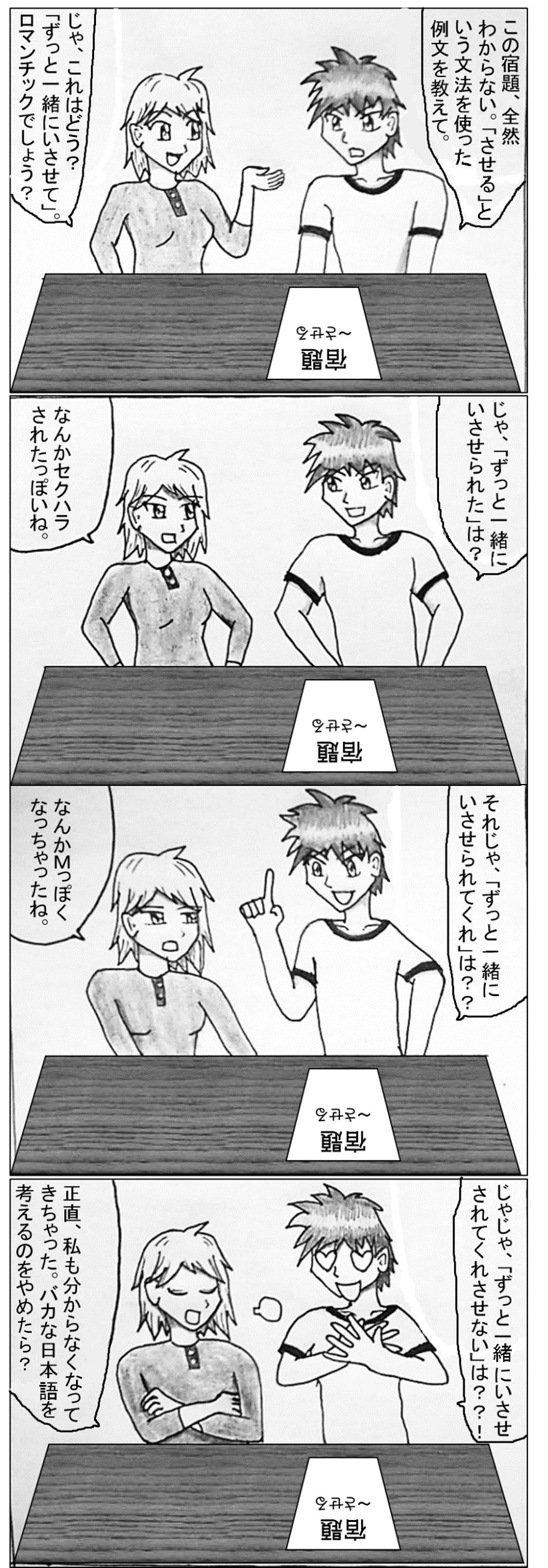Causative Verb Form
The causative form gets its name because it causes something to happen either by making or letting somebody do the action. While it may seem odd to have the exact same verb form for two very different uses, we’ll find that it’s not hard to tell which is intended when given the proper context. Below are the rules for conjugating a verb to the causative form. All verbs in the causative form are ru-verbs.
- For ru-verbs: Replace the last 「る」 with 「させる」.
Example- 食べ
る+させる = 食べさせる - 出
る+させる = 出させる
- 食べ
- For u-verbs: Change the last character as you would for negative verbs but attach 「せる」 instead of 「ない」.
Example- 飲
む+ま+せる = 飲ませる - 待
つ+た+せる = 持たせる - 買
う+わ+せる = 買わせる
- 飲
- Exceptions:
- する → させる
- くる → こさせる
Example
- 私にもやらせてよ。
Let me do it too. - びっくりさせないでよ。
Don’t make me surprised. (Don’t scare me.) - 無理矢理にお酒を飲ませるのはよくないよな。
(It’s) not good to forcibly make (someone) drink alcohol, huh? - もう来ていましたか。待たせてごめんなさい。
(You’re) were already here? Sorry (I) made (you) wait.
Passive Verb Form
The passive form is used to change the verb into a passive voice. A verb in the passive form is always a ru-verb. The conjugation rule for ru-verbs is the same as the rule for potential form. However, it’s not really hard to tell them apart given enough context.
- For ru-verbs: Replace the last 「る」 with 「られる」.
Example- 食べ
る+られる = 食べられる - 出
る+られる = 出られる
- 食べ
- For u-verbs: Change the last character as you would for negative verbs but attach 「れる」 instead of 「ない」.
Example- 飲
む+ま+れる = 飲まれる - 待
つ+た+れる = 持たれる - 買
う+わ+れる = 買われる
- 飲
- Exceptions:
- する → される
- くる → こられる
Example
- 姉にばれたら何をされるか分からないよ。
If (my) older sister finds out, (I) don’t know what will be done (to me). - 変な人だと思われたくない。
(I) don’t want to be thought of as (a) strange person. - 先から誰かに見られている気がしない?
Doesn’t it feel like (we’re) being watch by someone from just a while ago? - 行かないでと言われても約束だから行かないとだめだよ。
Even if I’m told, “Don’t go”, (it’s a) promise so (I) have to go, you know.
Using Causative and Passive together
The causative and passive conjunctions can be used together to describe being made to do something. The rules are simple, you simple need to conjugate the verb to the causative and then conjugate the resulting ru-verb to the passive form.
Example
- 待たせられるのは、嫌いでしょう?
Don’t (you) hate being made to wait? - 子供の時に、色々な物を食べさせられたから、好き嫌いは、あまりないよ。
As a child, (I) was made to eat various things so (I) don’t have a lot of likes/dislikes. - させられたと言うけど、結局、それはあんたのためだったんでしょう?
(You) say (you) were made to do (it) but in the end, (it) was for your benefit, right?
Comic 16 – バカな日本語を考えさせないでよ

- バカ (n/na-adj) – fool; stupid
- 日本語 【に・ほん・ご】 – Japanese language
- 考える 【かんが・える】(ru-verb) – to think
- この – this
- 宿題 【しゅく・だい】 – homework
- 全然 【ぜん・ぜん】 – not at all (when used with negative)
- 分かる 【わ・かる】 (u-verb) – to understand; to know
- 言う 【い・う】 (u-verb) – to say
- 文法 【ぶん・ぽう】 – grammar
- 使う 【つか・う】(u-verb) – to use
- 例文 【れい・ぶん】 – example sentence
- 教える 【おし・える】(ru-verb) – to teach; to inform
- じゃ – then; so; well
- これ – this
- どう – how
- ずっと – a long time
- 一緒 【いっ・しょ】 – together
- いる (u-verb) – to exist (animate)
- ロマンチック – romantic
- なんか – something
- セクハラ – sexual harassment
- くれる (ru-verb) – to give
- それじゃ – well then
- M 【えむ】 – slang for masochist
- なる (u-verb) – to become
- 正直 【しょう・じき】 – honesty; honestly
- 私 【わたし】 – polite, gender-neutral
- やめる (ru-verb) – to stop; to quit
ジョン:この宿題、全然わからない。「させる」という文法を使った例文を教えて。
アリス:じゃ、これはどう?「ずっと一緒にいさせて」。
ロマンチックでしょう?
ジョン:じゃ、「ずっと一緒にいさせられた」は?
アリス:なんかセクハラされたっぽいね。
ジョン:それじゃ、「ずっと一緒にいさせられてくれ」は??
アリス:なんかMっぽくなっちゃったね。
ジョン:じゃじゃ、「ずっと一緒にいさせされてくれさせない」は??!
アリス:正直、私も分からなくなってきちゃった。バカな日本語を考えるのをやめたら?
Toggle Translations
John: Don’t get this homework at all. Can (you) teach (me) an example sentence (that) uses させる grammar?
Alice: Ok, how about this? Let me be together with you forever. Romantic, isn’t it?
John: Ok, what about “I was made to be together with you forever”?
Alice: Sounds like (you’re) being sexually harassed.
John: Ok then, what about “Please let me be made to be with you forever”?!
Alice: (It’s) turning out like something masochist.
John: Ok ok, what about “She won’t let me be made to be with her forever”??!
Alice: Honestly, I starting to not understand it either. Why don’t (you) stop thinking about stupid Japanese?